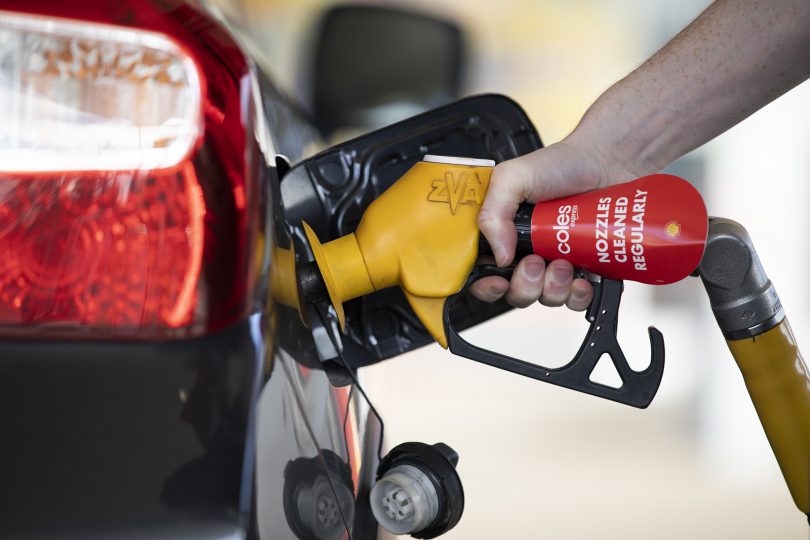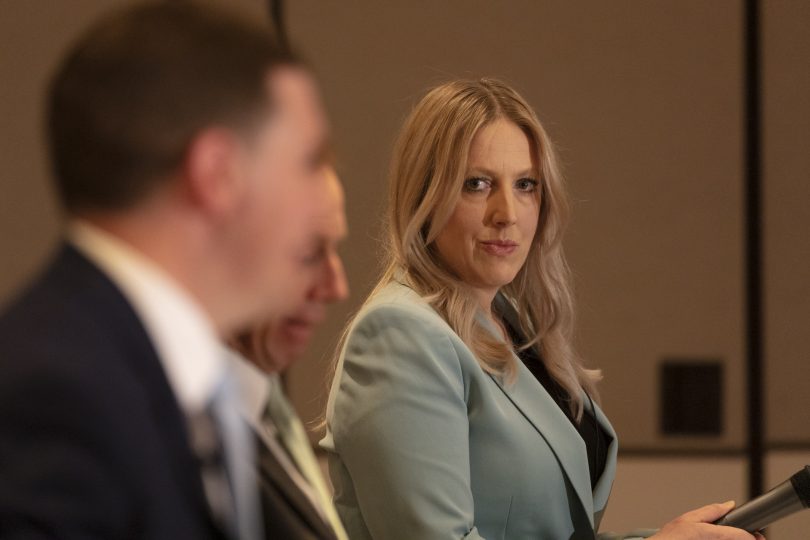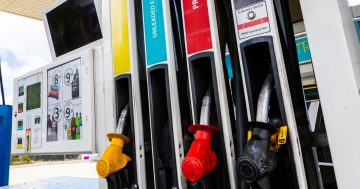
That’s going to hurt. Or will it? Photo: Michelle Kroll.
A cut to petrol taxes promises instant relief to Canberrans struggling to make ends meet, but it isn’t without its doubters.
In the 2022 Federal Budget, fuel excise – a tax on every litre of fuel – has been halved from 44.2 cents per litre to 22.1 cents in a bid to alleviate the effects of the Russia-Ukraine crisis on local petrol prices.
Once it flows through to the bowsers within two weeks, it will take Canberra’s average price of 95-octane petrol from $2.22 down to $2. This will reduce the cost of filling the 55-litre tank of our best-selling car, the Toyota RAV4 Hybrid, from $122 to $110.
The reduction is described as part of “a new temporary, targeted and responsible cost of living package to take the pressure off household budgets”, according to Treasurer Josh Frydenberg. The full excise rate will be reapplied in September.
The ACT Council of Social Services (ACTCOSS) described the news as little more than a Band-Aid.
“This Budget does very little for people in the ACT who are struggling to keep a roof over their head, put food on the table and pay the bills,” ACTCOSS CEO Dr Emma Campbell said.
“Most of this budget is temporary fixes, but we need permanent solutions.”
The Federal coffers will forgo almost $3 billion in revenue due to the fuel excise cut, much of which is normally diverted to transport projects.

ACTCOSS CEO Dr Emma Campbell said the ACT needed a budget of “permanent solutions”. Photo: Thomas Lucraft.
Dr Campbell argued this money would have been better spent lifting income support and boosting social and affordable housing.
“The ACT needed a budget that delivered solutions for the long term to reduce poverty and inequality and address climate change. We didn’t see that.”
The Automobile Association of Australia (AAA), with offices in Canberra and Melbourne, estimates the annual fuel excise bill for the average Australian family at $1,188. They said the cut will help city households who are “now paying more than $20,000 on annual transport costs”.
But they also describe the fuel excise as a “booby trap”, giving whoever wins the May election the unenviable task of reinstating the 44 cent fuel excise come September. The AAA has also voiced concerns motorists may not reap all the benefits.
“The AAA looks forward to understanding the measures to be put in place by the government to ensure every cent of this tax cut flows through to motorists,” AAA Managing Director Michael Bradley said.
“Motorists deserve to know how the Government will police this tax cut and ensure it’s not simply swallowed by fuel retailers. The experience overseas is that retailers are pocketing the profits and motorists continue to miss out.”
Under direction from the Federal Government, the Australian Consumer and Competition Commission (ACCC) said it will continue to closely monitor fuel prices following the cut to ensure no price gouging occurs.
“We expect that fuel retailers will pass on the cut in fuel excise to reduce the price at the bowser as soon as possible, as existing petrol stock levels are used up,” ACCC Chair Gina Cass-Gottlieb said.
“We will contact petrol retailers to set out our clear expectations that the savings are passed on to consumers and advise them that we will be monitoring their margins … If retailers make false or misleading statements to consumers that they have passed on the savings when they have not, the ACCC will not hesitate to take appropriate enforcement action.”
ACT Chief Minister Andrew Barr has previously called on the Federal Government to reduce fuel excise when it became apparent the Russia-Ukraine crisis was sending fuel prices through the roof. He also said they should further encourage the uptake of electric vehicles.
“It serves as a reminder that if you’re reliant, as Australia is, on imported fuel, then these sorts of economic shocks result in quite significant impacts at a household level,” he said.














